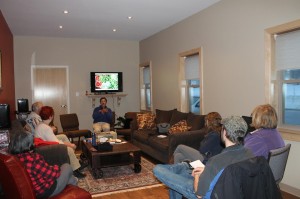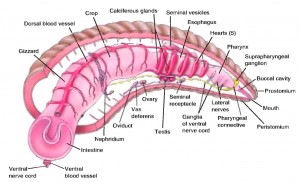Community Supported Agriculture & Gardens
Stephanie Kelley

Our last meeting featured two guest speakers, organic gardeners Cita Green and Tim Livingstone, who shared their gardening secrets and described methods of compost to an enthralled group.
Cita, a long-time resident of Perth, has developed a fabulous home garden over the years. Cita opted for relocation after the Flood of 2012 so her glorious Park Street Garden is no more… but she is a member of the P-A Community Garden and has been sharing her wisdom and tips with the rest of the group.
At this meeting, Cita described how she saves all suitable kitchen scraps throughout the winter for the compost piles she will create the following spring. She then mixes the saved scraps with leaves and grass clipping the following growing season, turning waste into fertile organic compost for her garden.
Compost heaps need to have the proper proportions of both “green” and “brown” vegetation and they need to be kept moist and receive air in order to decompose properly into good, rich fertilizer for the soil.
If you want to build up your soil, and grow healthy and happy plants, you need compost.
Tim Livingstone then took the floor and gave a fascinating presentation to further explain composting, vermiculture and organic gardening practices.
Along with his wife Kirsten and their children, Tim operates Strawberry Hill Farm in Pembroke, just outside of Woodstock. The Livingstones bought the farm in 2011, and have turned it into a veritable organic Garden of Eden. This beautiful farm is a stellar and inspiring example of a successful and productive Community Supported Agriculture enterprise. The farm grows a number of fruits and 50 varieties of vegetables, as well as raising free range chickens for eggs and meat along with a herd of grass fed cattle.
Twice each week during summer the Livingstones distribute 235 boxes of seasonal produce to Fredericton that are snapped up by eager customers, and they even have a winter vegetable box program available.
The garden group had asked Tim to speak primarily about the practice of vermiculture, which is the art of raising earthworms to create compost.

Worms are amazing creatures, and you can raise them in the comfort of your own home. A worm can eat half its weight in material every day, which it then digests and excretes, thus providing the worm farmer with an endless supply of the world’s best compost. I personally had visions of setting up a worm farm in my basement to help compost my kitchen scraps. but unfortunately, as with many things in life, it just ain’t that simple!
Worms are living creatures, and must be considered as livestock. A small scale worm farm is certainly doable, but certain conditions must be met and maintained regarding temperature, oxygen and moisture in order to keep your worms healthy and happy.
And you aren’t going to be able to just dump any old scraps in with your worms either, and expect them to munch it down. They are also talented escape artists, and are able to wriggle up and out of plastic bins which they will certainly do if they don’t like their living conditions.
To start your own worm farm, you need the species known as red wigglers. These worms are such efficient composters because they are lateral feeders, that is, they move laterally or horizontally through the soil.
Nightcrawlers, by contrast, are vertical feeders, which you’ve probably seen in action if you’ve ever surprised them…. they dive straight down into the soil to escape.
This feeding pattern is also why golf courses hate them…. They leave their piles of soil on top of the greens! The lateral feeding pattern of red wigglers, in comparison, keeps all their work underground.
Earthworms are hermaphroditic, that is, each worm contains both female and male sex organs, but they need a mate in order to reproduce. During mating, two worms will exchange sperm with each other, and then each worm will then produce fertilized eggs that will be left in the soil to continue the miraculous cycle of life.
Worm physiology is anti-pathogenic, too. Amazingly, deadly E-coli bacteria is destroyed if it comes into contact with a worm, whether it goes through the worm, or the worm goes through it!
Worms do not have lungs, they breathe through their skin, which is why we see them fleeing to the surface when it rains hard or they get flooded. They were suffocating, and so trying to get out in the air to breathe. I hate to see worms stranded on pavement after a storm, so I always pick them up and put them back where they can get to the soil again.
Earthworms are accurate barometers of soil health. If you turn over a spade full of dirt and find it full of worms, you know you’ve got some good, rich soil for your garden. Introducing compost and worms to any garden plot, provided it’s not a toxic dump that immediately kills them, will restore health and vitality to the soil.
The Perth-Andover Community Garden is located just off Legion Street behind the bandstand on West Riverside Drive. Cliff and Sylvia Crawford own this property, and generously have donated its use for the garden.
Plots are available if you’d like to join. We’ll be getting a storage shed, and water is hooked up so gardeners don’t have to lug buckets!
We have a Facebook page set up, send a message if you have any questions. Everyone is welcome, and we’ll be hosting other informative and educational presentations throughout the season.
